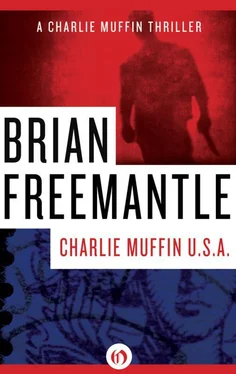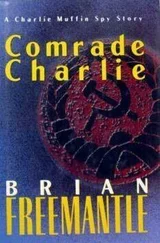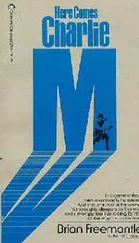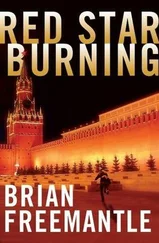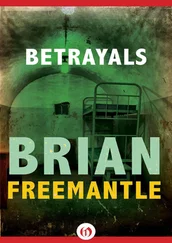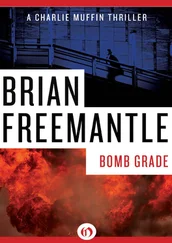Brian Freemantle - Charlie Muffin U.S.A.
Здесь есть возможность читать онлайн «Brian Freemantle - Charlie Muffin U.S.A.» весь текст электронной книги совершенно бесплатно (целиком полную версию без сокращений). В некоторых случаях можно слушать аудио, скачать через торрент в формате fb2 и присутствует краткое содержание. Жанр: Шпионский детектив, на английском языке. Описание произведения, (предисловие) а так же отзывы посетителей доступны на портале библиотеки ЛибКат.
- Название:Charlie Muffin U.S.A.
- Автор:
- Жанр:
- Год:неизвестен
- ISBN:нет данных
- Рейтинг книги:3 / 5. Голосов: 1
-
Избранное:Добавить в избранное
- Отзывы:
-
Ваша оценка:
- 60
- 1
- 2
- 3
- 4
- 5
Charlie Muffin U.S.A.: краткое содержание, описание и аннотация
Предлагаем к чтению аннотацию, описание, краткое содержание или предисловие (зависит от того, что написал сам автор книги «Charlie Muffin U.S.A.»). Если вы не нашли необходимую информацию о книге — напишите в комментариях, мы постараемся отыскать её.
Charlie Muffin U.S.A. — читать онлайн бесплатно полную книгу (весь текст) целиком
Ниже представлен текст книги, разбитый по страницам. Система сохранения места последней прочитанной страницы, позволяет с удобством читать онлайн бесплатно книгу «Charlie Muffin U.S.A.», без необходимости каждый раз заново искать на чём Вы остановились. Поставьте закладку, и сможете в любой момент перейти на страницу, на которой закончили чтение.
Интервал:
Закладка:
After his return from the beach and changed instructions to Santano had come news of two fresh interceptions of the boats, and because of the warning he had issued at their previous meeting and the displeasure which he had anticipated and received from the inner council of the organisation, he had summoned both Santano and Patridge to a conference and reviewed the disaster with an ice-cold detachment which had worried both of them.
Able now because the robbery had been brought forward to release Santano immediately, he had ordered that a personal aircraft be made ready for the following morning to fly his lieutenant directly to Bogota. So serious were the interceptions considered that he had ordered that Santano be accompanied by four others, physically to impress upon the Colombian organisers his annoyance at what had happened.
Santano and the accountant had remained for dinner, not for any social reason but because Terrilli was determined that neither would leave the house unaware that their own future employment and safety did not depend upon a higher rate of success. Throughout the meal, Terrilli never once consulted a watch or clock to establish how close the robbery was.
It was Santano who drew attention to the time, interrupting Terrilli at ten o’clock to ask if he could leave the room to check the arrangements for relaxing the security precautions for the stipulated period. Patridge was obviously curious, but refrained from any comment, instead continuing the conversation about the marijuana arrests and offering tentative suggestions for preventing a recurrence. Terrilli sat nodding, occasionally interposing a question or observation, and all the time his mind was occupied with thoughts of the quality and texture of what was soon to be his and how he would rearrange his collection to make the Romanov stamps the focal point of the display room.
Terrilli waited until Santano’s return and only then, after they had had coffee, did he push his chair away from the table to indicate that the conference was over.
Patridge had released his driver when he had been told to stay for dinner, and Terrilli agreed to Santano’s suggestion that he should drive the accountant home, seeing benefit in the frightened men continuing the discussion in the car.
Santano rechecked the security instructions as he went down the driveway and then out into the private road leading to Ocean Boulevard. He turned northwards and was almost at the point where the Flagler Bridge joins the mainland before the first of the Cubans moved quietly through the palms and shrubs bordering the approach to Terrilli’s castle.
Before they had attempted the Bay of Pigs disaster they had been trained in the basic art of jungle warfare, because Langley had imagined Castro’s overthrow would involve quite a lot of guerrilla fighting. During their imprisonment in the Soviet Union, that basic instruction had been perfected in the special K.G.B. training forest bordering the Black Sea, even though its precise advantage had not been guessed at the time. So they moved easily across the cropped lawns and through the clipped hedges, expertly using all available cover and remaining unseen by Terrilli’s patrolling guards and undetected by the Dobermann dogs they held on tight leash.
The Cubans had been infiltrated into America without any weapons, because they were so easy to obtain within the country. For this exercise they had been provided with ·375 Magnums, four carried Armalite rifles and one had a Russian-made AK47 which, if seized by the authorities, could be traced back to a three-term Vietnam veteran who had bartered it for his last three fixes of heroin and was now undergoing psychiatric rehabilitation in a New England sanatorium.
The Cubans’ training had brought them up to British commando or American marine standard. There were fourteen of them and they divided equally, dispersing themselves either side of the approach road and coming within twenty feet of the now secured electrified gates. Their information was that when the cars they were to intercept came along the road, those gates would already be opened. If, for any reason, that failed to happen or the gates closed before they could get through, they carried sufficient grenades to blow them off their hinges.
It was always possible, of course, that the grenades would not burst the gates. So, confident that there was still time before they had to spring the ambush, two of them crept undetected beneath the piercing searchlights and fixed plastic explosive charges to one of the concrete gate pillars, trailing the detonating wire back to where the main body was assembled.
They hoped the plastic wouldn’t be necessary. The noise would obviously attract the authorities, perhaps before they had the opportunity to retrieve the collection.
25
The idea of quietly but simply leaving Pendlebury’s control room had come quite spontaneously to Charlie. At the beginning of the robbery he had been as intent as everyone else on what was silently unfolding before him, and it was not until almost half way through that his attention faltered and he realised the absolute concentration of those around him; and saw it as an advantage. The thieves in the exhibition room didn’t know how they had been manipulated: Charlie did. And he wanted it to stop. It made him feel stupid.
He had risen slowly, remaining with his hands against the chair back for several seconds, then he gradually made his way towards the door leading into the corridor, all the time tending towards the bathroom, to provide an excuse if there should be a sudden challenge. The monotone commentary had continued uninterrupted and the heads stayed fixedly towards the television monitor. At the doorway there had been the final hesitation as Charlie had tensed against the sound of its opening and then, quickly, he had passed through and drawn it closed behind him.
Still without any clearly formulated idea of what he was going to do, his desire to run was overwhelming. But he had seen and learned enough about Pendlebury’s operation to be impressed by its efficiency and so he had walked instead, aware that a hidden observer might become suspicious of any unusual behaviour. It would only take seconds with the electronic equipment available to rescind that order against his assassination. And he needed all the time he could get to protect himself from discovery.
Throughout an operational career as extensive as his, there had obviously been attempts on Charlie’s life. Those that had arisen during assignments, people reacting against detection or arrest, he had regarded as nothing more than to be expected, considering the profession he had chosen, and confronted them – always succeeding in that confrontation – in a detached, impersonal way. They weren’t trying to destroy him, Charlie Muffin: they were fighting his department and the country he represented. Charlie thought that was fair.
But there had been other, isolated occasions which he had not accepted. Very early in his association with the Department, before Sir Archibald Willoughby had been appointed its head, Charlie had been infiltrated into Poland and half way through the mission realised that he was the front, the man to be exposed for identification for the benefit of the real operatives, in the hope of detecting an informant in the British Embassy. Two men he had drunk with in the Red Lion near the old Scotland Yard building and with whom he had supported Queen’s Park Rangers on a Saturday afternoon had suffered that time, neither knowing even now how it was that they came to be recognised and snatched off a deserted Warsaw street, each to face ten years’ imprisonment. After the Burgess and Maclean fiasco, when Charlie had been sent to Washington to close stable doors after the horses had gone to the knacker’s yard, a First Secretary at the Embassy there had so resented the justifiable criticism of laxity that he had invoked family relationship to complain through the Foreign Secretary to Sir Archibald, in the expectation of getting Charlie fired; and had never been able to convince anyone that he had no knowledge of how classified documents from the Ambassador’s personal safe came to be in his briefcase during a cocktail party at his Georgetown brown-stone which was why he had never risen further in the diplomatic service and had served his last eight terms in African embassies. And then there was the episode during the east-west border crossing in Berlin, when Charlie had been offered up for sacrifice for those who had succeeded Sir Archibald. Resignation had been the only recourse for both the English and American Directors after their humiliating capture and trade-off in exchange for the Russian spy-master. And not just the Directors. Nearly a hundred operatives were exposed and identified and were now only good for filing clerk duties at Langley or Whitehall.
Читать дальшеИнтервал:
Закладка:
Похожие книги на «Charlie Muffin U.S.A.»
Представляем Вашему вниманию похожие книги на «Charlie Muffin U.S.A.» списком для выбора. Мы отобрали схожую по названию и смыслу литературу в надежде предоставить читателям больше вариантов отыскать новые, интересные, ещё непрочитанные произведения.
Обсуждение, отзывы о книге «Charlie Muffin U.S.A.» и просто собственные мнения читателей. Оставьте ваши комментарии, напишите, что Вы думаете о произведении, его смысле или главных героях. Укажите что конкретно понравилось, а что нет, и почему Вы так считаете.
